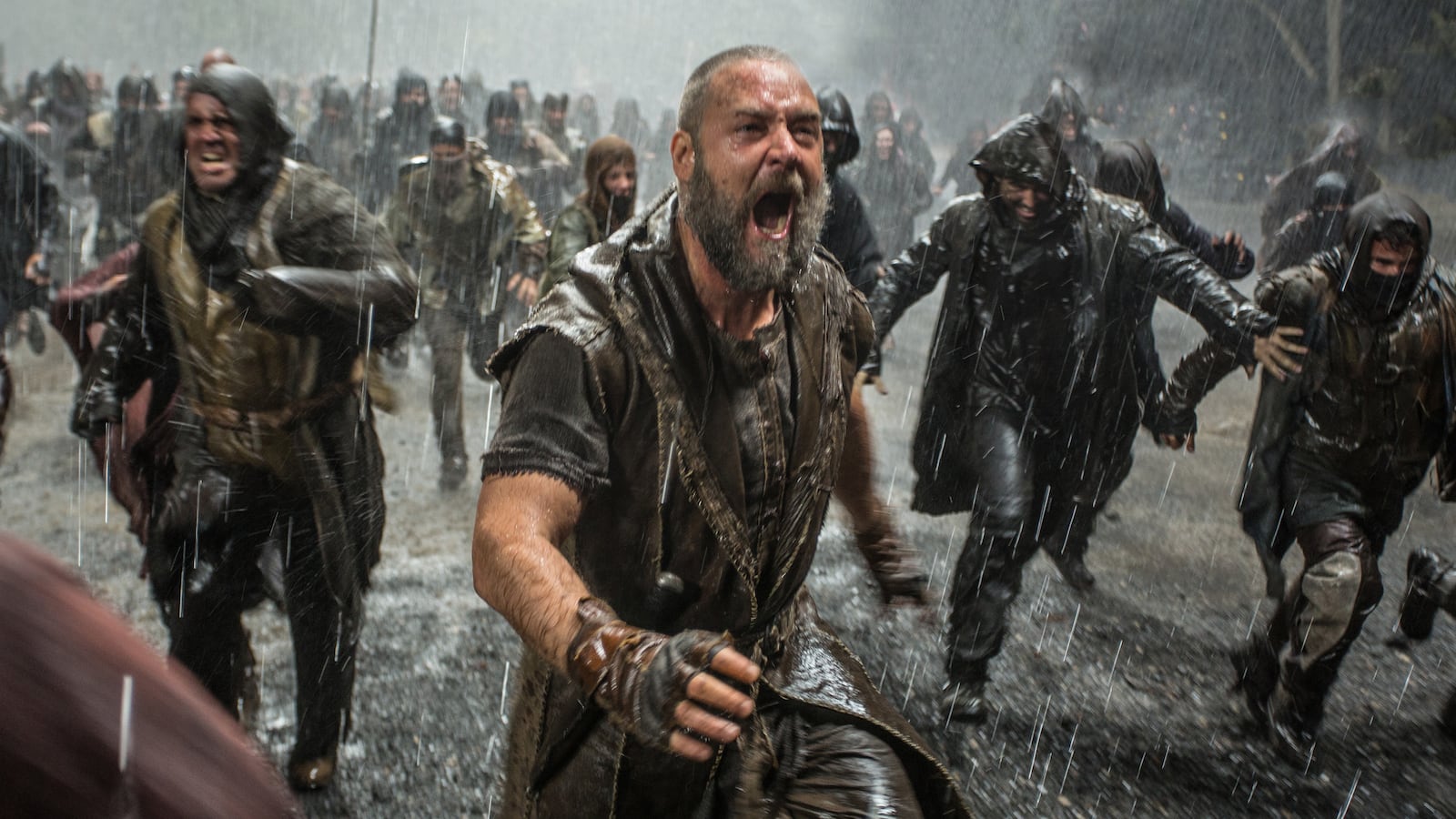Darren Aronofsky does not come from the Less Is More school of filmmaking—to put it mildly.

In Pi, a numbers theorist named Max Cohen decides to put a power drill through his own brain. Requiem for a Dream concludes with a montage of four junkies simultaneously enduring prostitution, prison, amputation, and electroshock therapy. At one point in Black Swan, Natalie Portman sprouts feathers, writhing in agony as her femurs snap back and morph into bird legs; at another point, Winona Ryder repeatedly stabs herself in the face with a nail file. In The Fountain, Hugh Jackman plays a conquistador. And a neuroscientist. And a futuristic astronaut.
So you can pretty much imagine what the director has done with Russell Crowe, $130 million, and the story of a 600-year-old man who fills a wooden ark the size of a stadium with thousands of animals and hunkers down inside as 40 days and 40 nights of floodwaters kill everything else on earth, including the rest of humanity.
Ambitious is one way of putting it. Bonkers is another.
After what seemed like years of buzz, ballyhoo, and controversy—the Evangelical complaints, the studio recuts, the endless test screenings, and the eventual restoration of Aronofsky's original vision—the apocalyptic epic Noah finally arrives in theaters on Friday. It is not, unfortunately, a great movie. But in an age of commercial anxiety and creative caution, it's a welcome respite all the same: a strange, earnest folly that's ultimately much more interesting than another slick, empty success.
Most of the early press about Noah has focused on its fidelity to the Bible (or lack thereof). Having seen the finished product, I doubt that anyone but the most fanatical fundamentalists will object. Sure, the characters call their deity "The Creator" rather than "God." And yes, not all of those characters appeared in Genesis. But go back and reread the Noah story sometime. It's basically an outline—Noah is righteous; God tells Noah to build a boat; it rains; and so on. There's no conflict, no villain, no characters, and very little dialogue.
A totally faithful movie wouldn't have been a movie at all. It would have been an elementary-school film strip. To adapt Noah for the big screen—Aronofsky's dream for more than a decade, apparently—the director had two choices: either invent or extrapolate. He chose the latter. And so almost everything in Noah, as nutty as it might seem, has its roots in the actual text of the Bible.
Take those craggy, six-armed, rock creatures who look like a cross between J.R.R. Tolkien's Ents and the Rockbiter from The Neverending Story. They're Aronofsky's mash-up of the giants, called Nephilim, who "were on the earth in those days," according to Genesis, and the fallen angels from the Book of Enoch known as the Watchers. Or Tubal-Cain, the warlord who slaughters Noah's father and eventually becomes Noah's main antagonist; Aronofsky borrowed him from Genesis 4, where he's described as "the forger of all instruments of bronze and iron." Or even Noah's daughter-in-law, Ila. The Bible says that Noah's sons had wives. Why not ask the lovely Emma Watson to play one of them?
The point here wasn't to deviate from scripture. The point was to infer a plausible drama from it. And on that front, Aronofsky has largely succeeded. In the film, two clans inhabit the Earth: the righteous sons of Seth (Noah and his family) and the wicked sons of Cain (Tubal-Cain and his hordes). Noah's people roam the scorched, treeless hills, sleeping in tents, using only what they need, and subsisting on a strict vegan diet; Tubal-Cain's people build vast cities, strip mine the earth, gorge on animals, and pretty much ruin everything. The Creator decides he wants a do-over, so in a series of hallucinogenic dream sequences, he warms Noah about the impending flood and instructs him to build a boat. Cain's people aren't allowed on board. Noah's—including his barren, adopted daughter Ila, who is betrothed to his son Shem—are. A bloody battle ensues.
Aronofsky's extrapolations are cleverly calibrated to "answer" all the questions left unanswered in the original story. How does Noah manage to build such a massive ship? The Watchers help him. How does Noah prevent other men (led by Tubal-Cain) from forcing their way onboard? The Watchers help with that, too. How does Noah keep the animals from eating each other? He puts them to sleep with some sort of smoking sedative. How does Noah's family begin to repopulate the earth? Ila has female twins with Shem. And so on. Aronofsky even manages to give the cipher-like Noah some semblance of an inner life, reverse-engineering the movie's central domestic drama from an unexplained scene in Genesis in which Noah, now safely ashore, gets drunk on wine. Aronofsky's Noah believes that the flood is supposed to wipe out all mankind—including, eventually, his family. So he prevents middle son Ham from bringing a potential spouse on board, and he threatens to kill Ila and Shem's unborn child if it turns out to be a girl. But ultimately Noah can't do it—and he drinks himself to distraction because he feels like a failure who disobeyed direct orders from heaven.
Aronofsky's fleshed-out Noah narrative raises plenty of big, earnest questions. Should man exert dominion over creation? Or should he serve as its steward? Where's the line between faith and fanaticism? Are we heading for another flood? (The director was an avid environmentalist in college.) The actors, meanwhile, are uniformly excellent, particularly the surly, steadfast Crowe as Noah and the crystalline Jennifer Connelly as his wife, Naameh. Visually, Noah is packed with moments of uncommon wit and beauty, including a time-lapse montage that illustrates how creation theology and Darwinian evolution may not necessarily be incompatible and a stunning sequence in which a vast forest effloresces instantaneously from a single spring of water. There is also plenty of batty, delightful excess. Screaming bodies piled high atop the last peak to remain above water. Transformers-like battle scenes that end with the Watchers ripping open their rocky chests, freeing the angels of light inside of them to skyrocket back to heaven. And Anthony Hopkins as Noah's hammy 969-year-old grandpa, Methuselah, who was apparently an incorrigible berry addict.
But impressive as Aronofsky's achievement is—he has managed to transform a few rather slim Bible verses into an idiosyncratic big-screen epic without betraying the spirit of the original—ultimately Noah never really jells. Or to be more exact: Noah never really connects. In interviews, Aronofsky has compared the antediluvian universe he's created to Tolkien's Middle Earth, and early on, as Noah and his family roam the black, arid highlands in their ancient duds, I couldn't help but be reminded of Games of Thrones as well. But the reason the alien worlds of Tolkien and George R.R. Martin come to life is that the characters who inhabit them are so much like us. They are real, even if everything around them is not.
But no one in Noah seems real at all. It's as if Aronofsky spent six days creating his elaborate heavens and earth, and then on the seventh day, instead of creating living, breathing characters, he rested. The devout father. The caring mother. The rebellious son. The devoted lovers. The brutish villain. All of them behave like cogs designed for narrative convenience; none of them transcend their archetypal origins or achieve three-dimensionality. So when Ham gravitates toward Tubal-Cain and plots to kill his father, it feels like something the story needs rather than something Ham wants. Same goes for Noah when he morphs into Jack Torrance onboard the ark, awaiting his unborn grandchild with a glazed, murderous look in his eyes. No matter how audacious or inventive a movie is, it can only be so good if you can't bring yourself to believe in the people on screen.
Still, we should all be glad Noah exists. It's easy to slam the studios for churning out crass sequels and safe remakes and endlessly rebootable superhero pictures. But Noah is something different: a big, risky bet on a talented auteur. Here's hoping Aronofsky's passion project makes a boatload of money—despite its flaws. Otherwise, Hollywood may give up on interesting, grown-up movies altogether.





